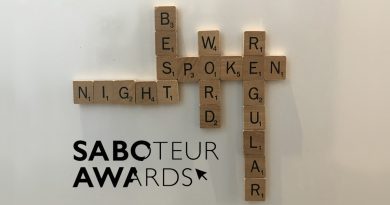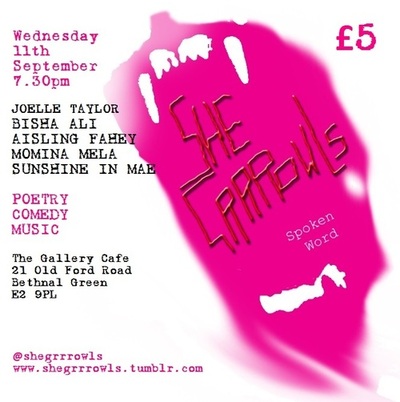Preview: Hammer & Tongue Oxford 2012 Final
-preview by James Webster–
This coming Tuesday the 12th of June sees the culmination of another year of Hammer & Tongue: Oxford with their Slam Final, pitting the winners of all 7 of this year’s heats against each other. Champion will slam against champion in an intriguing mix of established veterans and up-and-comers, youth and experience, with only one winner able to go on to the National Final (which if it is anything as exciting as this year’s finals at the Walton Music Hall, will be very special indeed).
As an added point of interest the winners will also be joined at this slam by the ‘Best of the Rest’, as the H&T team put all the runners up from this year into an online vote, allowing public opinion to decide which poet would take the ‘Wildcard’ spot in the final. After a close-run vote Neil Spokes emerged the victor!
With less than two days to go until the slam itself, Sabotage takes a look at each of the poets who will take to the stage to try and claim their spot in the national final.
October: Paul Askew
The self-styled ‘Official Sex Symbol of Oxford Poetry’, Paul booked the first place in the final by winning against stiff competition at the H&T February heat at Turl Street Kitchen (an event that included fellow finalist Anna Macrory as one of the feature poets and was headlined by Henry Bowers). Sabotage have reviewed Paul several times since, and if anything his comically surreal (and often surprising perceptive) poetry has improved. Askew’s more recent pieces like ‘Chaos Café’ and ‘The Extremely Abridged History of Paul Askew in 5 Dream Sequences’ have remained funny, while showing considerable depth and a talent for performance. Paul also edits the Ferment magazine.
Biggest Strength: his capability for blending humour and pathos, with an extremely original and absurdist voice.
Weakness?: his surrealism, while excellent, may not be for everyone, and he often reads his poems off the page, which usually hinders slam performance. But Askew is nothing if not a bucker of trends.
November: Pete the Temp
Pete the Temp should be known to most spoken word fans. A veteran of Hammer & Tongue he’s a former H&T National Slam champion (2009), and his funny, political, exceptionally performed works have wowed audiences all over the country at all kinds of poetry events and festivals. Boasting an easy and engaging stage presence, and a wealth of material (his ode to pedestrians and piece about working in a charity call centre always go down well), he has also just debuted his one-man show “Pete the Temp versus Climate Change” (soon to be reviewed on Sabotage).
Biggest Strength: performance experience. As well as having a way with audiences honed over years of gigging, he knows what it takes to win a slam and could easily do it again.
Weakness?: motivation. Having gone all the way before, and with the one-man show to concentrate on, he might just not want it as much as the other slammers, which could hinder his performance.
December: Aubrey Mvula
Sabotage have only seen him perform once. As a virtual unknown, he came out of nowhere to deliver an intensely moving poem about abuse and vulnerability, his understatedly powerful performance stunning the audience into silence. He won the slam (from a difficult early slot) and is possibly more of a wildcard in this slam than the actual ‘Wildcard’ Neil Spokes.
Biggest Strength: the power and clear emotion of his poetry.
Weakness?: from what we saw in December, he doesn’t lean towards comedy, and comic poems tend to win more often than not.
February: Davy Mac
Mac won the Valentine’s Day Slam with a funny and socially relevant poem about homosexuality and ‘Don’t-Ask-Don’t-Tell’ attitudes in the military. Having seen him perform several times now he’s got a range of poems about powerful issues that are always well expressed and often have a strong grasp of comic timing. His subject matter, while brave and always interesting, doesn’t always carry his audience with him, as his poem at the last H&T event (an odd mixture of juvenile fart jokes and creationism) demonstrated. But he maintains a talent for tackling bold issues clearly, boldly, and often with surprising beauty.
Biggest Strength: the strength of his beliefs that comes across in his poetry.
Weakness?: some of those beliefs may not take the audience with him.
March: Dan Holloway
Another poet that Sabotage have known and admired for a while, Dan runs Eight Cuts (Oxford multi-discipline arts organisation), organises gigs with a collective of poets known as the New Libertines, was the mastermind behind the Not the Oxford Literary Festival in March, and has just released a collection ‘Last Man out of Eden’ (soon to be reviewed on Sabotage). While his intricately constructed poems don’t always play well at slams, he crafts beautifully haunting images like few other poets I’ve seen. He also has a talent for social and political subject matter, pieces like ‘Mentalist’ and ‘Monsters’ tackle issues of riots, workfare schemes and mental health in original and intelligent manner (without ever descending into rhyming rants as some poets might).
Biggest Strength: the way in which he uses rhyme to flow seamlessly and quickly between his striking imagery.
Weakness?: honestly he has a tendency to over-perform his poems, as if trying to adopt a ‘slam style’, making the emotion and imagery seem a little forced.
April: Mark Niel
Another seasoned spoken word performer, he’s won a clutch of slams (he appeared in the H&T National Final this year) and always goes down a storm with audiences. He’s the epitome of the comic poet: voice, structure, body language and writing all leading towards the inevitable punchline. While it could be argued that doing so comes at the expense of meaning, it cannot be said that he doesn’t do it well; his poems have been greeted with big laughs every time I’ve seen him perform. But for me his poems sacrifice too much for the laugh, even their own internal logic lost to the funny (such as a comic poem about poets who perform in silly voices, delivered entirely in a silly voice and only enjoyable for that reason).
Biggest Strength: his aptitude for comedy, which almost always wins over the audience.
Weakness?: the nagging feeling that every one of his poems is fundamentally the same kind of joke, always delivered in the same way, which may hamper him when performing multiple pieces.
May: Anna McCrory
President of OUPS (Oxford University Poetry Society), Anna has performed aroundOxford,ManchesterandLondonand she organises a bunch of events too. She writes poems that are rich in whimsy and comedy, inviting the audience into her own charming world in which geeks rock out (in the library), children rap andArgoshas its very own wizard. While her material might come off as trite in the hands of a lesser poet, it’s her warmth as a performer and perceptiveness as a writer that make her poems more than just rhyming stand-up.
Biggest Strength: her easygoing and geeky performance.
Weakness?: perhaps a lack of the weighty themes that tend to garner high scores in slam.
Wildcard: Neil Spokes
Spokes performed strongly at two different H&T slams this year (coming second and third), which was enough to get him through to the Wildcard round and win his place in the final. His poetry when Sabotage has seen him has been strong, with a real aptitude for the slightly comic slam style. At best his poetry has been funny and adorably sweet, and even his poem about dropping his phone down the toilet was funny, if not especially deep (unless it was a really deep toilet).
Biggest Strength: his humour and sweetness.
Weakness?: toilet humour may not always go down well.
Conclusion: honestly with a real mix of styles and experiences, it seems to Sabotage that anyone could win. But regardless of who actually emerges victorious, we’re pretty sure after a night of excellent poetry it’ll be the audience who feel like champions.
Hammer & Tongue Oxford 2012 Final: Tuesday 12th May, 8pm, The Old Fire Station




Pingback: Review: Hammer & Tongue Oxford Slam Final 12/06/2012 « Sabotage